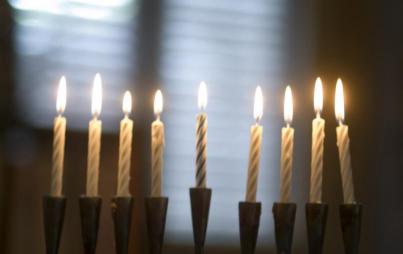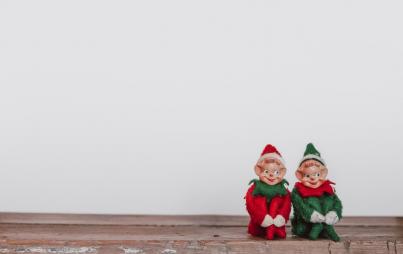
We're not trying to take Christmas away, OK?
Hanukkah, however, is a minor holiday. The story of Hanukkah isn’t even in the Jewish Bible.
It’s that time of year again. Remakes of "Little Drummer Boy" and "Baby, It’s Cold Outside" fill every store. Our mail is full of cards wishing us Happy Holidays. The season where we are constantly reminded that 71% of Americans identify as Christians has arrived.
What about the almost 30% of Americans who aren’t Christian? Speaking as a Jew, it can be an awkward time, especially with school concerts, holiday parties, and all the ways Christmas permeates December. Some Christians say or assume things which can be hurtful to Non-Christians, whether we’re Sikh or atheist. Here are a few things Christians should know to ensure that it’s a great holiday season for everyone.
1. Our holiest days aren’t (always) in Winter.
Growing up as a Jew, I can’t tell you how many times people equated Christmas to Hanukkah. From the outside, it’s easy to see why: it’s a holiday around the same time as Christmas, presents are exchanged for eight nights, and there are a lot of parties. On the surface, it sounds pretty similar to Christmas.
Hanukkah, however, is a minor holiday. The story of Hanukkah isn’t even in the Jewish Bible. The exchange of presents didn’t become a tradition until the 19th century, when Jewish Americans wanted to be more like their Christian neighbors. Our holiest days are actually in the fall: Rosh Hashanah and Yom Kippur.
Other religions also have holy days at other times of the year. In Hinduism, the holiest days, Holi and Diwali, happen in the spring and fall. Islam’s holiest month, Ramadan, fell between June and July this past year.
Is it great that schools and organizations try to be diverse this time of year? Yes, but it falls flat when others' holiest days are ignored, or worse, seen as a stumbling block to education or work. When this happens, the references and occasional song no longer becomes being diverse, it becomes tokenism.
Don’t know when your non-Christian friends' holiest days are? Just ask. Many of us are more than willing to talk about our faiths and traditions.
2. Relax about ‘Merry Christmas’ vs. ‘Happy Holidays.’
I’m not sure when it happened, but somehow "Merry Christmas" has become a loaded phrase for some people. Multiple people have become incredibly uncomfortable, apologizing profusely for wishing me "Merry Christmas" instead of "Happy Holidays." I almost felt like apologizing for making them feel awkward.
While I can’t speak for all non-Christians, I can say this: Many of us really don’t care. As I wrote earlier, for many of us this doesn’t feel like our holiday season. Sure, "Happy Holidays" is a bit less Jesus-focused, but whose holidays are we really celebrating?
If you accidentally say "Merry Christmas," a quick apology is more than enough in most cases. But hey, I’ll accept a drink or cup of coffee as well.
3. Please don’t pity us for not celebrating Christmas.
In the 21st century, it isn’t always clear who does and doesn’t celebrate Christmas. As a product of an interfaith marriage, I’ve celebrated Christmas every year with my Christian relatives as a family holiday. One atheist friend of mine flies internationally to celebrate with his family every year.
But even those who don’t celebrate the holiday still have their own traditions. There have been years I yearned to get Chinese takeout on Christmas like many of my Jewish friends. Mint Jelly vs. Moo shu vegetables? Pass the chopsticks, please. Some people have smaller family rituals: my Hindu co-worker takes his family to the movies for an all-day binge of the latest blockbusters.
It’s true we may not have a family stocking tradition or a favorite Christmas carol, but pitying us is demeaning. It assumes that we can’t have any traditions during this period. Just because our traditions don’t look like yours doesn’t make them any less precious or memorable.
So instead of assuming we sit at home crying over Ben and Jerry’s, ask us if we have our own traditions for the holiday. Who knows? You may like it so much you’ll want to incorporate into your own family tradition.
Most non-Christians aren’t trying to be the Grinch. We don’t want to rob you of your holidays or faith. The Christmas season is great: I love a good excuse for mulled wine and a white elephant gift exchange. If anything, we just want the space to not celebrate your holiday.
This isn’t an indictment of Christians. Many Christians are incredibly warm and understanding. I have countless friends who have wished me “Happy Hanukkah” last week. Hopefully, these few tips act as a reminder and will ensure you have an awesome holiday season with friends from a variety of religious backgrounds.







